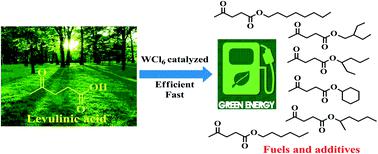当前位置:
X-MOL 学术
›
Sustain. Energy Fuels
›
论文详情
Our official English website, www.x-mol.net, welcomes your
feedback! (Note: you will need to create a separate account there.)
Fast and efficient upgrading of levulinic acid into long-chain alkyl levulinate fuel additives with a tungsten salt catalyst at low temperature
Sustainable Energy & Fuels ( IF 5.0 ) Pub Date : 2020-02-03 , DOI: 10.1039/c9se01287g Songyan Jia 1, 2, 3, 4, 5 , Jiao Ma 1, 2, 3, 4 , Dongping Wang 1, 2, 3, 4 , Kangjun Wang 1, 2, 3, 4, 6 , Qiang Zheng 1, 2, 3, 4 , Chunshan Song 4, 5, 7, 8 , Xinwen Guo 4, 5, 7, 8
Sustainable Energy & Fuels ( IF 5.0 ) Pub Date : 2020-02-03 , DOI: 10.1039/c9se01287g Songyan Jia 1, 2, 3, 4, 5 , Jiao Ma 1, 2, 3, 4 , Dongping Wang 1, 2, 3, 4 , Kangjun Wang 1, 2, 3, 4, 6 , Qiang Zheng 1, 2, 3, 4 , Chunshan Song 4, 5, 7, 8 , Xinwen Guo 4, 5, 7, 8
Affiliation

|
Levulinic acid (LA) is a promising renewable platform compound derived from biomass for the manufacture of various valuable chemicals, among which levulinate esters have been demonstrated to be good fuel additives. Many previous studies have focused on the production of short-chain levulinates for biofuels such as methyl and ethyl levulinates, but these esters suffer from some essential issues including a high oxygen content, low energy density (or heating value) and water solubility. Long-chain levulinate esters have similar structures to biodiesel. The long carbon chain may provide a higher carbon content and strong hydrophobicity, therefore improving the energy density and water insolubility. In this work, the synthesis of a long-chain levulinate ester, n-hexyl levulinate (HL), has been fast and efficiently achieved by the catalytic esterification of LA and 1-hexanol at low temperature. Tungsten hexachloride (WCl6) showed the most superior activity among the tested metal salt catalysts under mild conditions. A HL yield of ∼85% with almost complete LA conversion could be obtained at 50 °C after only 30 min. Other hexanols that have larger steric hindrances, such as 2-ethyl-1-butanol, 2-hexanol, 3-hexanol and cyclohexanol, could also promote efficient esterification with LA over the WCl6 catalyst, resulting in excellent product yields of ∼82–91%. The strategy applies to the efficient synthesis of longer chain levulinate esters such as n-octyl levulinate (OL) as well. The WCl6 catalyst was reusable several times in a consecutive batch reaction mode. The method reported herein offers a strategy for the efficient production of liquid fuels from LA, potentially bridging raw biomass feedstocks and terminal utilization of biobased products.
中文翻译:

低温下用钨盐催化剂将乙酰丙酸快速有效地转化为长链乙酰丙酸烷基酯燃料添加剂
左旋戊酸(LA)是一种有前途的可再生平台化合物,其衍生自生物质,可用于制造各种有价值的化学物质,其中乙酰丙酸酯已被证明是良好的燃料添加剂。先前的许多研究都集中在生产用于生物燃料的短链乙酰丙酸盐,例如乙酰丙酸甲酯和乙酯,但是这些酯存在一些基本问题,包括高氧含量,低能量密度(或热值)和水溶性。长链乙酰丙酸酯具有与生物柴油相似的结构。长碳链可以提供更高的碳含量和较强的疏水性,因此改善了能量密度和水不溶性。在这项工作中,长链乙酰丙酸酯的合成,Ñ乙酰丙酸己酯(HL)在低温下通过LA和1-己醇的催化酯化反应得以快速有效地实现。在温和条件下,六氯化钨(WCl 6)在测试的金属盐催化剂中显示出最优异的活性。仅在30分钟后,即可在50°C下获得约85%的HL收率,几乎完成了LA转化。其他具有较大空间位阻的己醇,例如2-乙基-1-丁醇,2-己醇,3-己醇和环己醇,也可以促进WLA 6催化剂上与LA的有效酯化作用,从而产生约82- 91%。该策略也适用于长链乙酰丙酸酯的有效合成,例如乙酰辛酸正辛酯(OL)。WCl 6连续分批反应模式中,催化剂可重复使用几次。本文报道的方法提供了从洛杉矶有效生产液体燃料,潜在地桥接生物质原料和最终利用生物基产品的策略。
更新日期:2020-02-03
中文翻译:

低温下用钨盐催化剂将乙酰丙酸快速有效地转化为长链乙酰丙酸烷基酯燃料添加剂
左旋戊酸(LA)是一种有前途的可再生平台化合物,其衍生自生物质,可用于制造各种有价值的化学物质,其中乙酰丙酸酯已被证明是良好的燃料添加剂。先前的许多研究都集中在生产用于生物燃料的短链乙酰丙酸盐,例如乙酰丙酸甲酯和乙酯,但是这些酯存在一些基本问题,包括高氧含量,低能量密度(或热值)和水溶性。长链乙酰丙酸酯具有与生物柴油相似的结构。长碳链可以提供更高的碳含量和较强的疏水性,因此改善了能量密度和水不溶性。在这项工作中,长链乙酰丙酸酯的合成,Ñ乙酰丙酸己酯(HL)在低温下通过LA和1-己醇的催化酯化反应得以快速有效地实现。在温和条件下,六氯化钨(WCl 6)在测试的金属盐催化剂中显示出最优异的活性。仅在30分钟后,即可在50°C下获得约85%的HL收率,几乎完成了LA转化。其他具有较大空间位阻的己醇,例如2-乙基-1-丁醇,2-己醇,3-己醇和环己醇,也可以促进WLA 6催化剂上与LA的有效酯化作用,从而产生约82- 91%。该策略也适用于长链乙酰丙酸酯的有效合成,例如乙酰辛酸正辛酯(OL)。WCl 6连续分批反应模式中,催化剂可重复使用几次。本文报道的方法提供了从洛杉矶有效生产液体燃料,潜在地桥接生物质原料和最终利用生物基产品的策略。











































 京公网安备 11010802027423号
京公网安备 11010802027423号